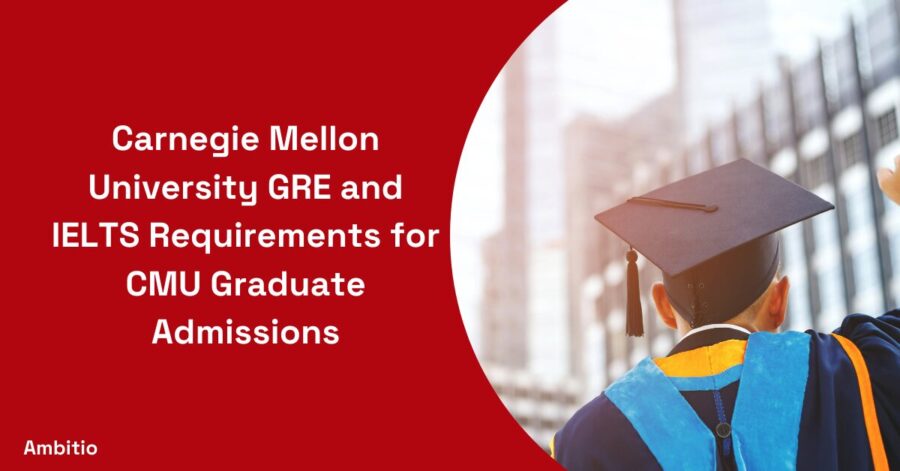3 March 2025
6 minutes read
Carnegie Mellon University GRE and IELTS Requirements for CMU Graduate Admissions

Key Takeaways
- Carnegie Mellon University GRE and IELTS requirements differ by program, with some requiring GRE scores and others making them optional for 2025.
- Non-native English speakers must meet the Carnegie Mellon University GRE and IELTS requirements, including a minimum IELTS score of 7.5.
- The Carnegie Mellon University GRE and IELTS requirements are program-specific, so applicants should confirm the details with their department for 2025.
Carnegie Mellon University (CMU) is a world-class institution known for its rigorous academic programs and highly competitive admissions process. Whether you are applying for an undergraduate degree or graduate programs, understanding the admission requirements—including GRE and IELTS score expectations—is crucial for success in the program. This guide will help applicants strengthen their application by providing insights into the minimum GRE and TOEFL scores, IELTS exam requirements, and other key aspects of CMU admissions.
Why Standardized Tests Matter in CMU Admissions for Undergraduate and Graduate Programs?
CMU has a selective admission process that evaluates applicants on multiple factors, including academic performance, test scores, work experience, statement of purpose, and faculty member recommendations. The admissions committee uses standardized tests like the GRE, IELTS and TOEFL to assess whether applicants have the necessary knowledge and aptitude to handle complex problems in a rigorous academic environment.

Key Facts About CMU Admissions:
- Highly competitive programs, especially in the School of Computer Science and College of Engineering.
- CMU seeks students with a strong background in engineering, machine learning, and public policy.
- Graduate students applying to the EPP master’s programs need a minimum GRE score, though some departments may waive this requirement.
- International students whose native language is not English must take an English language proficiency test such as the IELTS or TOEFL.
What is the Minimum GRE Score Requirement for Applicants at Carnegie Mellon University?
The minimum GRE scores required vary across programs. Some programs require the GRE, while others have waived it for admissions.
| Program | GRE Requirement | Additional Notes |
|---|---|---|
| School of Computer Science (MCDS, Machine Learning, etc.) | Required | Applicants generally need high GRE scores to be competitive. |
| College of Engineering | Varies | Some departments waive the GRE. |
| EPP Master’s Program | Not Required | EPP Programs do not accept GRE scores. |
| Language Technologies Institute | Required | Background in engineering is beneficial. |
| Master’s in Public Policy | Recommended | CMU offers GRE-optional policies for certain public policy programs. |
Tip: If GRE is optional, submitting a strong score can help strengthen your application.
What GRE Score Should You Aim For?
Successful applicants typically have a GRE score above 320 (Verbal + Quantitative). However, there is no officially stated minimum GRE score.
- Quantitative Reasoning: 160+
- Verbal Reasoning: 160+
- Analytical Writing: 4.0 scale
Did you know? Many students overestimate the importance of GRE scores. The admissions committee also considers your coursework, faculty recommendations, and research experience.
IELTS Exam, Duolingo and Other English Proficiency Requirements
All international students whose native language is not English need to submit proof of English proficiency. Carnegie Mellon accepts the IELTS and TOEFL as part of the graduate admissions and undergraduate admission process.

Minimum Scores for English Language Tests:
| Test | Minimum Score | Subscore Requirements |
|---|---|---|
| IELTS | 7.5 | At least 7.5 in each section |
| TOEFL iBT | 102 | At least 25 per section |
| Duolingo English Test | 135 | At least 135 per category |
| Cambridge English | 191 | At least 191 per section |
Note: Scores must be two years old or newer at the time of application.
TOEFL vs IELTS: Which One is Preferred?
- Carnegie Mellon states that the TOEFL is preferred, but the latter is also accepted.
- Duolingo is an alternative for students looking for strong but flexible testing options.
Tip: If you’re unsure which test to take, check the frequently asked questions (FAQs) section on Carnegie Mellon’s education FAQ page for the most up-to-date policies.
What is the Admission Requirement and Application Process at Carnegie Mellon?
Applying to Carnegie Mellon involves multiple steps similar to the type of application processes at other top universities. Below is a simplified process that demonstrates the breadth of requirements for students who are applying to UG, potentially a master’s, and Ph.D. programs.

International students may need to take the TOEFL or an equivalent English proficiency test to meet language requirements.
1. Check the Application Deadline
- Undergraduate Deadline: January 2, 2025
- Graduate Programs Deadline: Varies by department; typically December – February 2024
- Next Cycle: If you miss this cycle, you may need to reapply for the next cycle.
2. Submit Required Documents
Every applicant, including current students must submit the following:
- Common Application (for UG courses)
- Official Transcripts (Must show previous study performance and completed coursework)
- GRE Score (If required by the program)
- IELTS/TOEFL(Required if English is not your native language)
- Statement of Purpose (Provides insight into your background and interests)
- Letters of Recommendation (Usually from professors or a faculty member)
- Application Fee (Check the department-specific fees)
Tip: Please ensure that all documents are submitted before the application deadline to avoid delays.
3. Consider Financial Aid and Visa Requirements
- Carnegie Mellon offers financial aid for both UG and graduate students.
- If you are an international student, you will need a visa to study in the U.S.
Tip: Permanent residents of the U.S. may have different requirements. Please refer to CMU’s website for details.
Why Choose Carnegie Mellon University?
Carnegie Mellon acceptance is highly competitive, but the university is known for its world class education. The engineering education, public policy programs, and school of computer science are among the best in the world.
What Makes Carnegie Mellon Unique?
- Computer Science Undergraduate and Graduate Programs ranked among the top globally.
- EPP Graduate Programs focus on addressing complex problems in policy and technology.
- Carnegie Mellon University acceptance process seeks qualified applicants generally from diverse backgrounds.
- CMU offers cutting-edge research opportunities in AI and engineering education.
Top 15 Universities Similar to CMS for International Students (Including Acceptance Rate)
Carnegie Mellon is renowned for its strong emphasis on technology, engineering, and computer science. For students exploring institutions with similar academic rigor and focus, several universities stand out.
Below is a curated list of 15 universities comparable to the university, detailing their country, ranking, rate of acceptance, tuition fees, average starting salary for graduates, general acceptance requirements, and notable courses offered.
| Sl. No. | University | Country | Ranking | Admission Rate | Tuition Fees (USD) | Average Starting Salary (USD) | Acceptance Requirements | Notable Courses Offered |
|---|---|---|---|---|---|---|---|---|
| 1 | Massachusetts Institute of Technology (MIT) | USA | 1 | 5% | 57,590 | 124,000 | High GPA, strong standardized test scores (SAT/ACT), letters of recommendation, personal essays, demonstrated interest in STEM fields. | Computer Science, Engineering, Artificial Intelligence |
| 2 | Stanford University | USA | 2 | 4% | 56,169 | 120,000 | Exceptional academic records, high SAT/ACT scores, extracurricular achievements, essays, and recommendations. | Computer Science, Engineering, Business |
| 3 | California Institute of Technology (Caltech) | USA | 3 | 3% | 54,600 | 115,000 | Top performance, strong SAT/ACT scores, research experience, recommendation letters, and essays. | Physics, Engineering, Computer Science |
| 4 | Georgia Institute of Technology (Georgia Tech) | USA | 4 | 21% | 31,370 (out-of-state) | 85,000 | High GPA, competitive SAT/ACT scores, strong background in math and science, essays, and recommendations. | Engineering, Computer Science, Business |
| 5 | University of California, Berkeley (UC Berkeley) | USA | 5 | 17% | 44,008 (out-of-state) | 100,000 | Excellent academic records, high SAT/ACT scores, personal insight questions, and extracurricular involvement. | Computer Science, Engineering, Business |
| 6 | University of Illinois at Urbana-Champaign | USA | 6 | 59% | 34,312 (out-of-state) | 80,000 | Strong performance, competitive SAT/ACT scores, essays, and involvement in relevant extracurricular activities. | Engineering, Computer Science, Business |
| 7 | University of Michigan, Ann Arbor | USA | 7 | 20% | 52,266 (out-of-state) | 85,000 | High GPA, strong SAT/ACT scores, essays, extracurricular activities, and recommendations. | Engineering, Computer Science, Business |
| 8 | University of Texas at Austin | USA | 8 | 32% | 40,032 (out-of-state) | 80,000 | Solid academic records, competitive SAT/ACT scores, essays, and extracurricular involvement. | Engineering, Computer Science, Business |
| 9 | University of Washington | USA | 9 | 56% | 39,114 (out-of-state) | 85,000 | Good performance, SAT/ACT scores, personal statements, and extracurricular activities. | Computer Science, Engineering, Business |
| 10 | University of Toronto | Canada | 10 | 43% | 45,690 (international) | 70,000 | Strong academic records, proficiency in English, personal statements, and recommendations. | Engineering, Computer Science, Business |
| 11 | Imperial College London | UK | 11 | 14% | 42,000 (international) | 75,000 | Excellent performance, proficiency in English, personal statement, and recommendations. | Engineering, Computer Science, Business |
| 12 | National University of Singapore (NUS) | Singapore | 12 | 25% | 38,200 (international) | 65,000 | Strong academic records, proficiency in English, personal statements, and recommendations. | Engineering, Computer Science, Business |
| 13 | Swiss Federal Institute of Technology (ETH Zurich) | Switzerland | 13 | 27% | 1,500 (international) | 90,000 | Excellent academic performance, proficiency in English/German, motivation letter, and recommendations. | Engineering, Computer Science, Business |
| 14 | University of Cambridge | UK | 14 | 21% | 33,000 (international) | 70,000 | Outstanding academic records, proficiency in English, personal statement, and recommendations. | Engineering, Computer Science, Business |
| 15 | University of Oxford | UK | 15 | 17% | 35,000 (international) | 70,000 | Exceptional performance, proficiency in English, personal statement, and recommendations. | Engineering, Computer Science, Business |
Note: Rankings are based on recent evaluations of universities with strong programs in technology and engineering. Tuition fees and salaries are approximate and subject to change. Acceptance requirements and acceptance rates vary by program and are generalized here.
Conclusion
Carnegie Mellon is an excellent choice for students looking for strong programs in computer science, public policy, and engineering. While acceptance requirements vary by program, a strong GRE score, high IELTS score (7.5+), and competitive study performance can increase your chances of success.
If you’re planning to apply, start early, follow the application process, and meet the minimum GRE and IELTS requirements to put forward the best possible application.
Looking for strong chances at Carnegie Mellon? Prepare well, submit your best scores, and craft a compelling application to join the ranks of admitted students at this world-class university! Join Ambitio Pro and watch your dreams come true!
FAQs
What are the Carnegie Mellon University GRE and IELTS requirements for 2025 admissions?
The Carnegie Mellon University GRE and IELTS requirements vary by program, with some requiring GRE scores and others making them optional. For IELTS, a minimum score of 7.5 is generally required for non-native English speakers.
Are GRE scores required for Carnegie Mellon University graduate programs?
Carnegie Mellon University GRE and IELTS requirements differ by department, with some graduate programs requiring GRE scores and others waiving them for 2025 admissions.
What is the minimum IELTS score required for Carnegie Mellon University admissions?
For Carnegie Mellon University GRE and IELTS requirements, non-native English speakers must achieve a minimum IELTS score of 7.5 to demonstrate English proficiency.
Do undergraduate applicants need to submit GRE scores for Carnegie Mellon University?
Carnegie Mellon University GRE and IELTS requirements for undergraduate programs do not generally include the GRE; however, IELTS is required for international students.
Can I apply to Carnegie Mellon University without submitting GRE scores?
Depending on the program, the Carnegie Mellon University GRE and IELTS requirements may not include the GRE, as some departments have made it optional for 2025 admissions.
How do Carnegie Mellon University GRE and IELTS requirements affect my application?
Meeting the Carnegie Mellon University GRE and IELTS requirements strengthens your application, especially if your GRE scores are high and your IELTS score meets the minimum 7.5.
What is the TOEFL requirement for Carnegie Mellon University if I don’t meet the IELTS score?
If you don’t meet the Carnegie Mellon University GRE and IELTS requirements, you can submit TOEFL scores, where a minimum score of 102 is typically required for graduate programs.

You can study at top universities worldwide!
Get expert tips and tricks to get into top universities with a free expert session.
Book Your Free 30-Minute Session Now! Book a call now




























